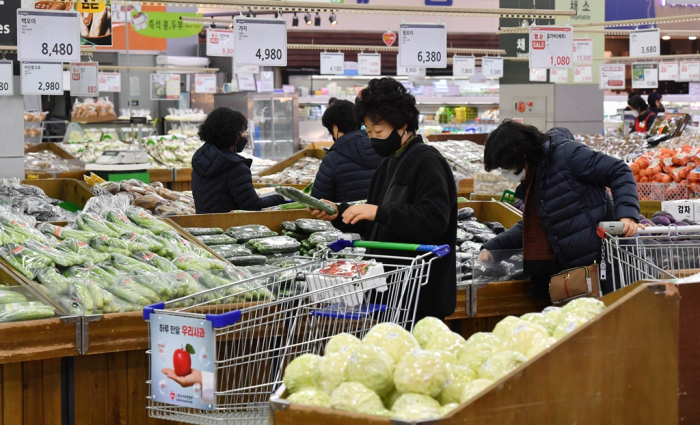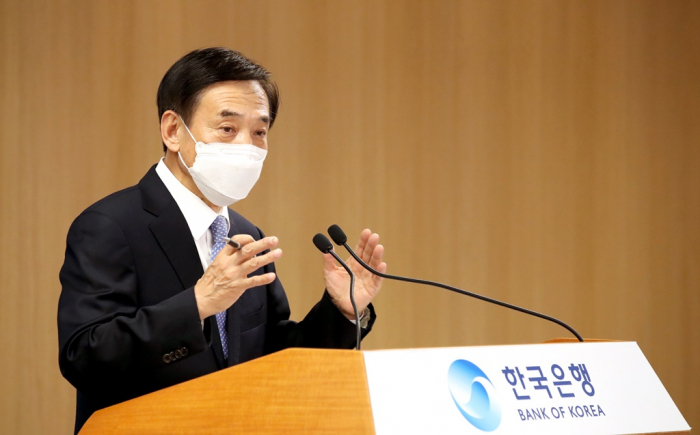Economy
S.Korea’s 2022 inflation may shoot to 11-year peak
Annual inflation is expected to be around 3%, the highest since 2011, as consumer prices rise more than 3% for the fourth straight month
By Feb 04, 2022 (Gmt+09:00)
2
Min read
Most Read
LG Chem to sell water filter business to Glenwood PE for $692 million


Kyobo Life poised to buy Japan’s SBI Group-owned savings bank


KT&G eyes overseas M&A after rejecting activist fund's offer


StockX in merger talks with Naver’s online reseller Kream


Mirae Asset to be named Korea Post’s core real estate fund operator



South Korea’s inflation this year is expected to accelerate to an 11-year high, adding to expectations of further interest rate hikes later this year, as consumer prices in Asia’s fourth-largest economy continued to rise more than the central bank’s forecast.
Consumer prices rose 3.6% in January from a year earlier, a notch lower than a 3.8% decade peak in November 2021, according to government data released on Friday. The inflation remained above the 3% level for the fourth straight month.
Higher prices of raw materials such as crude oil and global supply chain disruptions put upward pressure on consumer inflation. Petroleum product prices jumped 16.4%, while the cost of agricultural, livestock and fisheries grew 6.3%.
Core inflation, the change in the costs of goods and services excluding food and energy, stood at 3% last month, the highest since January 2012.
The Bank of Korea projected the country's annual headline inflation in 2022 to be higher than mid-2%.
Experts, however, expected the annual inflation to rise to around 3% this year, the highest since 2011 when consumer prices surged 4%. The average consumer inflation rate for 2021 was at a decade high of 2.5%.
“The inflation is predicted to stay high in the first half, given the base effect, while the rise is unlikely to significantly slow in the second because of (high) import costs and raw material prices,” said Kim Sang-bong, an economics professor at Hansung University in Seoul, forecasting the annual inflation at the high 2% level or even 3% this year.
Yonsei University’s economics professor Sung Tae-yoon expected the rise in prices to accelerate further if rate hikes in developed economies are delayed, saying “inflation is predicted to stay around 3% for the time being, given the sustained global supply issue surrounding ongoing US-China tensions.”
GLOBAL TIGHTENING
Central banks worldwide have already tightened their monetary policies, absorbing liquidity.
The US Federal Reserves plans a rate hike in March and quantitative tightening in the second half, while the Bank of England raised interest rates on Thursday and in December last year. The European Central Bank is likely to wind down bond purchases.
South Korea’s central bank already increased borrowing costs back to a pre-pandemic level, by raising the base interest rate in August and November last year, as well as January this year.

The Bank of Korea is expected to hike rates further to curb rising inflationary pressure and household debt.
The government is also considering various measures to stem inflation including an extension of fuel tax cuts.
“We will come up with steps to ensure a stable supply of raw materials such as expanding rare metal reserves, raising inventory targets for each non-ferrous metal, increasing key grains stockpiles and securing overseas grain supply networks,” said First Vice Finance Minister Lee Eog-weon.
“In particular, we will closely monitor global oil prices and consider an extension of fuel tax cuts, following the trend.”
Write to So-Hyeon Kim and Ik-Hwan Kim at alpha@hankyung.com
Jongwoo Cheon edited this article.
More to Read
-
 Central bankingBOK restores interest rates to pre-pandemic level
Central bankingBOK restores interest rates to pre-pandemic levelJan 14, 2022 (Gmt+09:00)
3 Min read -
 Central bankingBank of Korea raises interest rates, signals further hikes
Central bankingBank of Korea raises interest rates, signals further hikesNov 25, 2021 (Gmt+09:00)
3 Min read -

Comment 0
LOG IN


